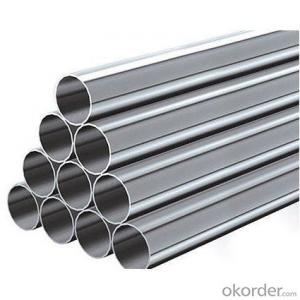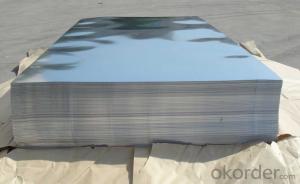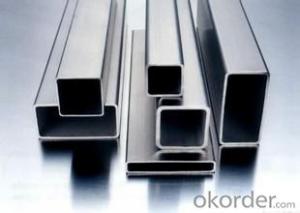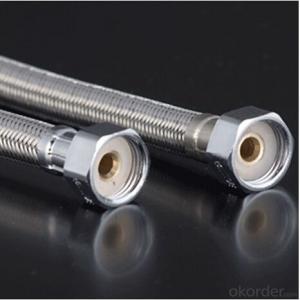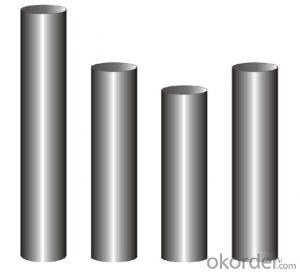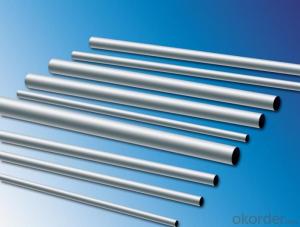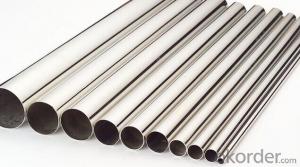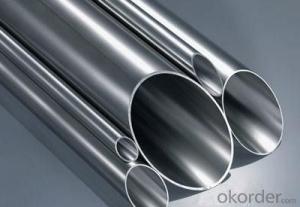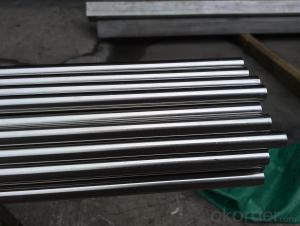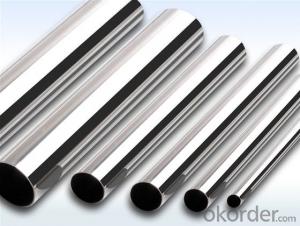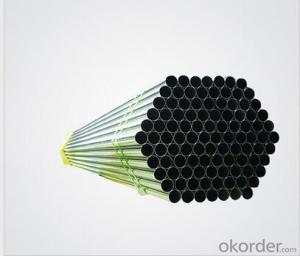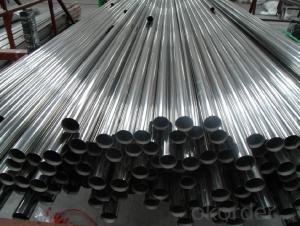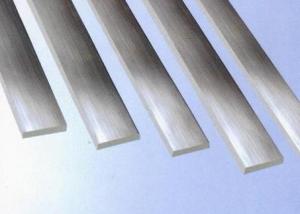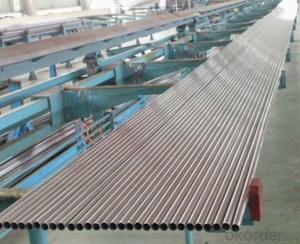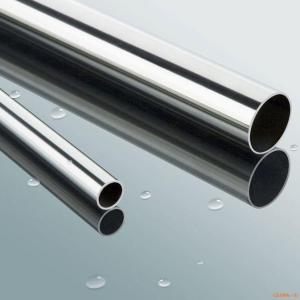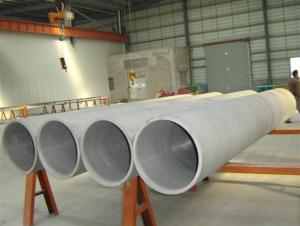ASTM A269 Seamless Stainless Steel Pipe
- Loading Port:
- Tianjin
- Payment Terms:
- TT OR LC
- Min Order Qty:
- 25 m.t.
- Supply Capability:
- 1000 m.t./month
OKorder Service Pledge
OKorder Financial Service
You Might Also Like
Quick Details
| Standard: | JIS,AISI,ASTM,DIN,EN | Place of Origin: | China (Mainland) | Brand Name: | OKORDER |
| Model Number: | stainless steel pipe | Type: | Seamless | Steel Grade: | 300 Series |
| Application: | stainless steel pipe | Certification: | ISO | Thickness: | 1-30 |
| Outer Diameter: | 6-530 | Quality: | good stainless steel pipe | Brand: | stainless steel pipe |
Packaging & Delivery
| Packaging Detail: | polywood box |
| Delivery Detail: | 35days |
Specifications
ASTM A269 Seamless Stainless Steel Pipe:
Outside diameter from 6mm to 530mm.
Wall thickness from 0.5mm to 38.1mm.
ASTM A269 Seamless Stainless Steel Pipe
1. Material | TP304/304L, 316/316L, 310S, 317L, 321, 347H,etc. |
S31803, 32750, etc. | |
2. Standard | ASTM, ASME, DIN, EN, ISO,JIS, GOST, etc. |
3. Type | Seamless |
4. Size range | OD: from 6mm to 1000mm (NPS from 1/8'' to 40'') |
WT: from 0.7mm to 38mm (Schedule from 5S to XXS) | |
Length: fix length or un-fix length, Max 30meters | |
5. Produce process | Pilgering and cold drawn |
6. Surface process | Pickling and annealing |
AP tube | |
BA tube | |
7. Marking | JW, GRADE, seamless, STANDARD, SIZE, HT NO. |
8. Package | Bundles with waterproof cloth outside. |
or plywood box. | |
9. Min order quantity | 500 KG |
10. Sample | Yes |
11. OEM accepted | Yes |
12. Production capacity | 300 tons per month |
13. Payment term | T/T or L/C. |
14. Certificate | ISO 9001, PED |
15. Third party ertificate | BV, LR, SGS, TUV, CCS, ABS, etc. |
- Q: Can stainless steel pipes be used for irrigation systems?
- Yes, stainless steel pipes can be used for irrigation systems. Stainless steel is a durable and corrosion-resistant material, making it suitable for use in irrigation systems where water exposure is constant. Additionally, stainless steel pipes are known for their longevity and ability to withstand high pressure, making them a reliable choice for irrigation applications.
- Q: How do you protect stainless steel pipes from internal corrosion?
- One effective way to protect stainless steel pipes from internal corrosion is by utilizing a corrosion inhibitor. Corrosion inhibitors are chemicals that can be added to the fluid flowing through the pipes to create a protective layer on the inner surface of the pipe. This layer acts as a barrier, preventing the corrosive agents in the fluid from coming into direct contact with the stainless steel. There are various types of corrosion inhibitors available, and the selection depends on the specific application and the fluid being transported. Some common corrosion inhibitors include organic inhibitors, which form a protective film on the pipe surface, and inorganic inhibitors, which react with the corrosive agents to form less harmful compounds. Another method to protect stainless steel pipes from internal corrosion is by using cathodic protection. Cathodic protection involves connecting the stainless steel pipe to a sacrificial anode made of a more reactive metal, such as zinc or aluminum. This creates a galvanic cell, where the anode corrodes instead of the stainless steel pipe. By sacrificing the anode, the pipe is effectively protected from internal corrosion. Regular maintenance and inspection are also crucial in preventing internal corrosion. It is essential to monitor the condition of the pipes, identify any signs of corrosion or damage, and promptly address any issues. Flushing the pipes with clean water or appropriate cleaning solutions can help remove any deposits or contaminants that could contribute to corrosion. Furthermore, maintaining proper fluid composition and pH levels is vital to prevent internal corrosion. In some cases, adjusting the fluid's pH or adding corrosion inhibitors specific to the fluid being transported can significantly reduce the risk of corrosion. Overall, a combination of corrosion inhibitors, cathodic protection, regular maintenance, and appropriate fluid management can effectively protect stainless steel pipes from internal corrosion, ensuring their longevity and optimal performance.
- Q: What are the weld sleeves for stainless steel pipes?
- Set of galvanized steel pipe stainless steel pipe according to the material quota.
- Q: What are the specifications of stainless steel decorative pipes?
- Decorative tubes, then more specifications. Our factory has the smallest 9.5MM, the largest to see how big you can, directly with the industrial pipe to polish it
- Q: Can stainless steel pipes be used for oil and gas applications?
- Yes, stainless steel pipes can be used for oil and gas applications. Stainless steel is highly resistant to corrosion and can withstand high temperatures and pressures, making it an ideal material for transporting and storing oil and gas. Additionally, stainless steel pipes have excellent mechanical properties, such as high tensile strength and toughness, which ensure their durability and reliability in demanding oil and gas environments. Stainless steel pipes are commonly used in various applications within the oil and gas industry, including drilling, production, refining, and transportation of oil and gas products.
- Q: What is the difference between seamless and seamless stainless steel pipes?
- The difference between seamless and seamless stainless steel pipes lies in the manufacturing process and the composition of the material used. Seamless pipes are manufactured by extruding a solid billet through a piercing rod to create a hollow tube. This process eliminates the need for any welds or joints, resulting in a continuous and smooth pipe with no weak points. Seamless pipes are known for their strength, durability, and ability to withstand high-pressure and high-temperature applications. They are commonly used in industries such as oil and gas, petrochemical, and power generation. On the other hand, seamless stainless steel pipes are a specific type of seamless pipe that is made from stainless steel. Stainless steel is an alloy that contains a high percentage of chromium, which provides excellent corrosion resistance and high-temperature strength. This makes seamless stainless steel pipes suitable for applications where resistance to corrosion, oxidation, and heat is crucial, such as in the food and beverage, pharmaceutical, and chemical industries. In summary, while both seamless and seamless stainless steel pipes are manufactured through a seamless process, the difference lies in the material used. Seamless stainless steel pipes offer the added benefits of corrosion resistance and high-temperature strength due to their stainless steel composition.
- Q: Are stainless steel pipes resistant to caustic solutions?
- Yes, stainless steel pipes are generally resistant to caustic solutions. Stainless steel is known for its corrosion resistance properties, which makes it suitable for handling various corrosive substances, including caustic solutions.
- Q: The difference between galvanized steel pipe and stainless steel pipe
- Galvanized pipes are generally used for fire fighting and circulating water supply (non living water supply)
- Q: Can stainless steel pipes be used for power plants?
- Yes, stainless steel pipes can be used for power plants. Stainless steel offers excellent corrosion resistance and high-temperature strength, making it suitable for various applications in power plants, including carrying fluids and gases, heat exchangers, and steam distribution systems.
- Q: What is the difference between seamless and longitudinal welded stainless steel pipes?
- The manufacturing processes and structural characteristics of seamless and longitudinal welded stainless steel pipes vary. Seamless pipes, for instance, are formed by heating a solid cylindrical bar of stainless steel and pushing it through a die to create a hollow tube. This process eliminates the need for welded seams, resulting in a uniform composition and consistent strength and corrosion resistance. As a result, seamless pipes are commonly used in high-pressure applications like oil and gas pipelines and refinery equipment due to their superior mechanical properties. In contrast, longitudinal welded pipes are made by joining two separate pieces of stainless steel plate or sheet together through a longitudinal welding process. The plates or sheets are rolled into a cylindrical shape, and the seam is welded along the length of the pipe. This welding technique provides structural integrity and strength to the pipe, although it may introduce some slight inconsistencies in the steel's composition and properties. However, these inconsistencies can be minimized through appropriate welding techniques and quality control measures. Longitudinal welded pipes are widely used in various fields, including structural and architectural projects, as well as in industries such as food processing, pharmaceuticals, and petrochemicals. In conclusion, the main distinction between seamless and longitudinal welded stainless steel pipes lies in their manufacturing methods and resulting structural characteristics. Seamless pipes have no welded seams and offer excellent mechanical properties, making them suitable for high-pressure applications. On the other hand, longitudinal welded pipes are created by welding two separate stainless steel pieces together and are commonly utilized in different industries. The choice between these types of pipes depends on specific requirements and considerations for the intended application.
Send your message to us
ASTM A269 Seamless Stainless Steel Pipe
- Loading Port:
- Tianjin
- Payment Terms:
- TT OR LC
- Min Order Qty:
- 25 m.t.
- Supply Capability:
- 1000 m.t./month
OKorder Service Pledge
OKorder Financial Service
Similar products
Hot products
Hot Searches
Related keywords
